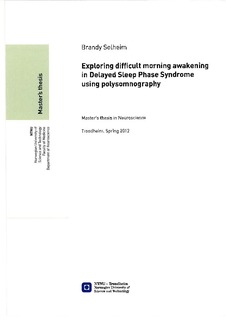Exploring difficult morning awakening in Delayed Sleep Phase Syndrome using polysomnography
Master thesis
Permanent lenke
http://hdl.handle.net/11250/264163Utgivelsesdato
2012Metadata
Vis full innførselSamlinger
Sammendrag
Objective: Difficult morning awakening is an important symptom of delayed sleep phase syndrome (DSPS), but there is little knowledge about this phenomenon. The first aim of this study was to test the hypothesis that DSPS patients have more slow wave sleep (SWS) during the latter half of the night than what is normally observed. The second aim of the study was to examine whether the difficult awakening had any relation to a specific sleep stage upon awakening and sleep inertia. The third aim was to test if cognitive performance was reduced upon awakening.
Methods: Six patients diagnosed with DSPS and four healthy controls were recruited. The subjects kept a sleep diary for 14 days and underwent actigraphy recording for seven days prior to an experimental night at the sleep laboratory where a polysomnography (PSG) recording took place. In addition, saliva samples were collected for dim light melatonin onset (DLMO) testing.
Results: The PSG analysis showed that the DSPS patients do not have more SWS during the latter half of the night. In fact, the controls were observed to have more SWS than the patients during the latter half of the night. All subjects woke up from either stage Nl, N2 or REM. Two of the patients were difficult to wake up from REM sleep. No significant differences were observed between the groups regarding sleep inertia. Likewise, no significant difference was found in the patients' cognitive performance when tested in the afternoon compared to immediately after awakening.
Conclusions: The most interesting finding is the difficult awakening from REM sleep in two of the patients. This yields for further investigation. As no differences were observed regarding cognitive performance, it is possible to conclude that the patients in this study did not experience any major temporary cognitive impairment upon awakening.
